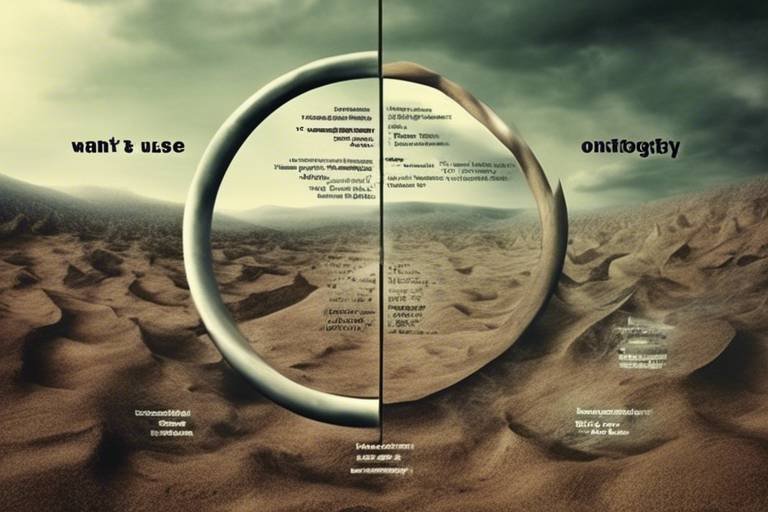Exploring the Relationship Between Ontology and Ethics
Welcome to a fascinating journey where we dive deep into the intricate connections between ontology and ethics. You might be wondering, how can the very essence of existence shape what we consider to be right and wrong? Well, that's exactly what we're here to unravel! Ontology, the philosophical study of being and existence, serves as the bedrock for our understanding of moral principles. Just like a tree's roots nourish its growth, our ontological beliefs provide the foundation for ethical frameworks across various philosophical landscapes.
Imagine sitting around a campfire, sharing stories about what it means to be human. Each tale reflects a different perspective on existence and morality. Some may argue that our moral values are universal truths, while others might see them as constructs shaped by culture and context. This ongoing dialogue is where ontology and ethics intersect, illuminating how our perceptions of reality influence our moral reasoning.
As we explore this relationship, we'll uncover how different ontological perspectives can lead to vastly different ethical conclusions. For instance, if one believes that all beings possess intrinsic value, this belief will likely shape their ethical stance on issues like animal rights and environmental conservation. Conversely, if one views existence through a more mechanistic lens, they may prioritize human interests above all else. It's these nuances that make the study of ontology and ethics not just academic but profoundly relevant to our everyday lives.
In the following sections, we'll delve into the nature of ontology, the philosophical underpinnings of ethics, and how these concepts intertwine to influence our moral compass. We'll also examine real-world dilemmas and case studies that highlight the practical implications of these philosophical discussions. So, buckle up as we embark on this enlightening exploration of how understanding existence can profoundly impact our ethical judgments!
Ontology is more than just a fancy word; it’s the study of what exists and the nature of being. Think of it as the framework that helps us categorize everything from physical objects to abstract concepts. When we ponder questions like “What is reality?” or “What does it mean to exist?” we are engaging in ontological inquiry. This exploration is crucial for framing ethical discussions because our understanding of existence shapes our perceptions of reality and influences moral reasoning.
For example, consider the ontological status of human beings. If we view humans as unique and possessing inherent dignity, this belief will guide our ethical decisions regarding human rights and social justice. On the other hand, if we see humans merely as biological organisms, our ethical considerations might shift dramatically. This is why ontology is not just an abstract philosophical concept; it has tangible implications for how we navigate moral landscapes.
Ethics, on the other hand, is the study of moral values and principles. It helps us understand what we ought to do, how we should act, and the values we hold dear. Just as ontology provides a foundation for understanding existence, ethics offers a framework for evaluating our actions and decisions. In this section, we will outline key ethical theories and their implications, laying the groundwork for how ontology intersects with moral philosophy.
Metaethics delves into the nature of ethical statements and the existence of moral facts. It raises profound questions about whether moral truths exist independently of human beliefs. Here, ontology plays a pivotal role. If we believe that moral facts exist in some objective sense, we are likely to adopt a realist stance in ethics. Conversely, if we view moral principles as constructs shaped by societal norms, we lean towards anti-realism. This interplay between metaethics and ontology is where the philosophical rubber meets the road!
The debate between realism and anti-realism in ethics raises significant questions about the existence of moral truths. Realists argue that moral statements can be objectively true or false, while anti-realists contend that moral values are subjective and culturally constructed. This discussion highlights how ontological perspectives influence these opposing views. If you believe in an objective moral order, you might find yourself aligning with realism. If you see morality as a human invention, anti-realism may resonate more with you.
Constructivist approaches to ethics assert that moral principles are constructed rather than discovered. This perspective emphasizes the role of human agency in shaping ethical norms. Here, ontological assumptions significantly impact this viewpoint. If we view humans as rational agents capable of constructing meaning, we are more likely to embrace a constructivist approach. This section will analyze how these ontological beliefs influence our understanding of moral principles.
In applied ethics, the relationship between ontology and ethical decision-making becomes strikingly clear. Different ontological views affect real-world ethical dilemmas, such as those encountered in medical ethics, environmental ethics, and social justice. For instance, how we perceive the value of life can dramatically influence our stance on issues like euthanasia or abortion. Understanding these ontological underpinnings is essential for navigating the complexities of ethical decision-making in today’s world.
Examining specific case studies illustrates the practical implications of ontology on ethical decision-making. These examples will demonstrate how ontological beliefs shape responses to moral challenges. For instance, consider environmental ethics. The ontological status of nature influences our moral responsibilities toward the environment. If we view nature as a mere resource for human exploitation, our ethical obligations may be minimal. However, if we see nature as a complex web of interdependent beings, we are likely to advocate for sustainable practices and conservation efforts.
The ontological status of nature profoundly influences environmental ethics. Different views of existence affect our moral responsibilities toward the environment. Are we stewards of the Earth, or merely its inhabitants? This fundamental question shapes our ethical considerations regarding conservation, climate change, and biodiversity. Understanding these ontological perspectives can empower us to make more informed and responsible choices in our interactions with the natural world.
Bioethics raises critical questions about the value of life, with ontology playing a key role. Differing ontological beliefs impact ethical considerations in medical and biological contexts. For example, how do we define the beginning and end of life? Is life sacred, or is it a biological process subject to human manipulation? These questions are not just philosophical musings; they have real-world implications for policies surrounding reproductive rights, euthanasia, and medical research.
- What is ontology? - Ontology is the philosophical study of being and existence, exploring the nature of reality.
- How does ontology influence ethics? - Our understanding of existence shapes our moral principles and ethical frameworks.
- What are the key debates in ethics? - Major debates include realism vs. anti-realism, and the role of constructivism in moral values.
- Can you give an example of ontology in applied ethics? - Environmental ethics is a prime example, where differing ontological views affect our moral responsibilities toward nature.

The Nature of Ontology
Ontology, at its core, is the philosophical study that investigates the nature of being, existence, and reality. Imagine it as the foundation of a house; without a solid base, the structure above cannot stand firm. In the same way, our understanding of existence shapes the very framework of our ethical discussions. When we ponder what it means to "be," we are not just engaging in abstract thought; we are laying the groundwork for how we interpret moral principles and ethical frameworks.
To dive deeper, ontology asks profound questions such as:
- What entities exist?
- What does it mean for something to exist?
- Are abstract concepts like numbers or properties real, or are they mere constructs of the human mind?
These inquiries are not merely academic; they have real-world implications. For instance, if we adopt a materialistic ontology that asserts only physical entities exist, our ethical considerations might lean towards a more utilitarian approach, where the consequences of actions are measured primarily by their tangible outcomes. Conversely, if we embrace a more idealistic view that acknowledges the existence of abstract entities, we may find ourselves inclined towards deontological ethics, where the morality of actions is judged based on adherence to rules or duties.
Moreover, ontology plays a critical role in shaping our perceptions of various ethical dilemmas. Consider the debate surrounding artificial intelligence (AI). If we define AI as a mere tool, our ethical considerations may focus on its utility and efficiency. However, if we entertain the notion that AI possesses some form of consciousness or moral standing, our ethical framework must expand to include rights and responsibilities towards these entities. This shift highlights how our ontological beliefs can dramatically alter our moral reasoning.
In essence, ontology is not just an abstract philosophical discipline; it is a lens through which we view the world and make ethical choices. By understanding the nature of being, we can better navigate the complex landscape of moral philosophy, ensuring that our ethical frameworks are robust, coherent, and reflective of our deepest beliefs about existence.

Ethics: A Philosophical Overview
Ethics, a branch of philosophy, delves into the realm of moral values and principles that guide human behavior. It raises fundamental questions about right and wrong, justice and injustice, and the nature of a good life. To truly grasp the intricate relationship between ontology and ethics, one must first understand the various ethical theories that have emerged over time. These theories not only provide frameworks for moral reasoning but also reflect our ontological beliefs about existence and reality.
At its core, ethics can be divided into several key categories, each offering unique insights into moral philosophy. For instance, normative ethics focuses on establishing standards for what is morally right or wrong, while descriptive ethics seeks to understand how people actually behave in moral contexts. Meanwhile, metaethics examines the nature of ethical statements and the existence of moral facts, which ties directly back to ontological questions. Understanding these categories helps us see how our views on existence shape our moral judgments.
Moreover, ethical theories can be broadly categorized into three main types:
- Consequentialism: This theory posits that the morality of an action is determined by its outcomes. The most well-known form is utilitarianism, which advocates for actions that maximize overall happiness.
- Deontology: In contrast, deontological ethics focuses on rules and duties. It asserts that certain actions are inherently right or wrong, regardless of their consequences. This perspective often aligns with the beliefs of philosophers like Immanuel Kant.
- Virtue Ethics: This approach emphasizes the character of the moral agent rather than specific actions. It encourages individuals to cultivate virtuous traits, thereby leading to a good life.
Each of these ethical frameworks not only presents a different approach to moral reasoning but also reflects underlying ontological assumptions. For example, a consequentialist might view the world as a complex system where outcomes matter most, while a deontologist may believe in absolute moral truths that exist independently of human actions. This divergence in understanding existence leads to varied ethical conclusions.
Furthermore, the implications of these ethical theories extend beyond theoretical discussions; they influence practical decision-making in everyday life. For instance, consider how a business leader might approach a dilemma regarding environmental sustainability. A consequentialist might prioritize the long-term benefits of sustainable practices for the company and society, while a deontologist might argue that the company has an inherent duty to protect the environment, regardless of the financial implications. This illustrates how ontology shapes our ethical frameworks and, consequently, our actions.
As we continue to explore the intersections of ontology and ethics, it becomes clear that our understanding of existence profoundly impacts our moral principles. By examining the philosophical underpinnings of ethics, we can better appreciate how different ontological views lead to diverse ethical perspectives, ultimately guiding our moral choices in complex situations.
- What is the difference between ethics and morality? Ethics refers to the systematic study of what is right and wrong, while morality pertains to the actual beliefs and practices of individuals or societies.
- How does ontology influence ethical decision-making? Ontology shapes our understanding of existence, which in turn affects our moral frameworks and the principles we apply to ethical dilemmas.
- Can ethical theories coexist? Yes, different ethical theories can coexist and often do in practice, as individuals may draw from multiple frameworks to navigate moral challenges.

Metaethics and Ontological Foundations
When we dive into the realm of metaethics, we encounter profound questions that challenge our understanding of morality itself. At its core, metaethics seeks to explore the nature, origins, and meaning of ethical concepts. It goes beyond simply asking what is right or wrong; it probes deeper into the very fabric of our moral beliefs. This is where the relationship between ontology and ethics becomes particularly intriguing. Ontology, the study of being and existence, lays the groundwork for how we perceive moral truths.
Imagine for a moment that our ethical beliefs are like a house. The ontology serves as the foundation upon which the entire structure stands. If the foundation is shaky, the house may crumble under pressure. Similarly, if our ontological assumptions about the nature of reality are flawed, our ethical reasoning may lead us astray. For instance, consider the debate surrounding the existence of moral facts. Are there objective moral truths that exist independently of human beliefs, or are moral values merely social constructs? This question is pivotal in metaethics and is largely influenced by our ontological views.
To further illustrate this connection, let's examine two primary ontological perspectives that often come into play in metaethical discussions:
- Realism: This perspective posits that moral facts exist independently of our beliefs or perceptions. Realists argue that just as physical objects exist in the world, so do moral truths. This view suggests that our ethical statements can be true or false based on these objective moral facts.
- Anti-Realism: In contrast, anti-realists contend that moral values are not objective truths but are instead constructed by social, cultural, or individual factors. For them, moral statements do not reflect any independent reality but are expressions of our subjective experiences and preferences.
The implications of these perspectives are profound. If one subscribes to realism, then ethical discussions can be framed around discovering these moral truths. However, for anti-realists, the focus shifts to understanding how our social constructs shape our moral frameworks. This divergence highlights the intricate dance between ontology and ethics—where our beliefs about existence influence our moral reasoning.
Moreover, the ontological foundations of metaethics also raise questions about the nature of ethical statements. Are they merely descriptive, reflecting our emotional responses, or do they carry a prescriptive weight that guides our actions? These inquiries are essential for understanding how we construct our ethical theories and the role that ontology plays in shaping them.
In summary, the exploration of metaethics and its ontological foundations reveals the complex interplay between our understanding of existence and our moral principles. By examining how different ontological views inform our ethical beliefs, we can gain deeper insights into the very nature of morality itself. This relationship not only enhances our philosophical inquiries but also enriches our practical approaches to ethical dilemmas in everyday life.
1. What is metaethics?
Metaethics is the branch of ethics that examines the nature, origins, and meaning of moral values and statements. It goes beyond normative ethics, which deals with what actions are right or wrong.
2. How does ontology relate to ethics?
Ontology, the study of being and existence, influences our understanding of moral truths. Our beliefs about what exists shape our ethical frameworks and the principles we adhere to.
3. What are the key differences between realism and anti-realism in ethics?
Realism posits that moral truths exist independently of human beliefs, while anti-realism argues that moral values are socially constructed and do not reflect any objective reality.
4. Why is the relationship between ontology and ethics important?
Understanding this relationship can provide insights into the foundations of our moral beliefs and help us navigate complex ethical dilemmas in various contexts.

Realism vs. Anti-Realism
The debate between realism and anti-realism in ethics is a fascinating exploration of whether moral truths exist independently of human beliefs or whether they are merely constructs of our social and cultural contexts. At its core, realism posits that there are objective moral facts that exist regardless of individual opinions or societal norms. Think of it like a mountain range; no matter how many people disagree about its height, the mountains stand tall, unyielding, and indifferent to our perceptions. This perspective suggests that moral statements can be true or false based on an objective reality, akin to scientific truths.
On the flip side, anti-realism argues that moral truths do not exist in any objective sense. Instead, they are shaped by human experiences, emotions, and societal constructs. Imagine a painting: its beauty is not inherent but rather a reflection of the viewer’s perception and cultural background. Anti-realists contend that ethical claims are more about expressing sentiments or social agreements than discovering universal truths. This perspective raises important questions about the nature of morality and how it functions in our lives.
To illustrate the distinction further, consider the following table that summarizes key differences between realism and anti-realism:
| Aspect | Realism | Anti-Realism |
|---|---|---|
| Existence of Moral Facts | Yes, objective and independent | No, subjective and dependent on context |
| Nature of Moral Statements | True or false based on reality | Expressions of attitudes or agreements |
| Example | Stealing is wrong, regardless of opinion | Stealing is wrong in some cultures, but not in others |
This ongoing discussion has profound implications for ethical theory and practice. For instance, if one subscribes to realism, they may advocate for universal human rights based on the belief that these rights exist independently of cultural perspectives. Conversely, an anti-realist might argue that rights are culturally constructed and should be understood within specific social contexts. This difference in viewpoint can lead to vastly different ethical conclusions and policies.
Ultimately, the realism vs. anti-realism debate challenges us to reflect on our own beliefs about morality. Are we searching for universal truths, or are we more inclined to view ethics as a fluid and evolving construct? This inquiry not only shapes our philosophical understanding but also influences our everyday moral decisions.

Constructivism in Ethics
Constructivism in ethics presents a fascinating perspective that challenges traditional notions of moral discovery. Instead of viewing ethical principles as pre-existing truths waiting to be uncovered, constructivists argue that these principles are actively created through social processes and interactions. This idea can be likened to building a house; just as a house is constructed from various materials and designs shaped by the builder's vision and societal influences, ethical principles are assembled from cultural, social, and personal experiences.
At the core of constructivism lies the belief that moral norms are not simply found but are instead constructed through rational discourse and communal agreement. This notion raises intriguing questions about the role of ontology in shaping our ethical frameworks. For instance, if we consider the ontological status of moral truths as something that is not fixed but rather fluid and subject to change, how does this influence our understanding of right and wrong? This perspective suggests that our ethical decisions are deeply intertwined with our views on existence and reality.
To illustrate this relationship, let's take a closer look at some key ideas that underpin constructivism in ethics:
- Social Context: Constructivism emphasizes the importance of social interactions and cultural contexts in shaping our moral beliefs. The ethical values we hold are often reflective of the communities we belong to, highlighting the significance of dialogue and consensus.
- Rational Discourse: Constructivists advocate for the use of rational discussion as a means to negotiate and establish ethical norms. This approach aligns with democratic principles, where diverse voices contribute to the formation of shared values.
- Dynamic Nature of Morality: Constructivism posits that moral principles are not static but evolve over time. As societies change, so do their ethical standards, making it crucial to remain open to revising our moral beliefs in light of new evidence or perspectives.
These elements illustrate how constructivism offers a unique lens through which to view ethical dilemmas. By recognizing that our ethical frameworks are constructed rather than discovered, we can better understand the implications of our ontological beliefs. For instance, if one believes that moral truths are universal and unchanging, they may struggle to accept differing perspectives that arise from diverse cultural backgrounds. Conversely, a constructivist approach encourages a more inclusive dialogue that acknowledges and respects these differences.
In practice, constructivism can lead to more flexible and adaptive ethical frameworks that are capable of addressing complex moral issues. This adaptability is particularly vital in today's rapidly changing world, where global interconnectedness and cultural exchanges challenge traditional ethical boundaries. By embracing a constructivist viewpoint, we can foster a more nuanced understanding of morality that is responsive to the needs and values of various communities.
In conclusion, the intersection of ontology and constructivism in ethics opens up a world of possibilities for moral reasoning. As we continue to explore and debate the nature of existence and our ethical responsibilities, it becomes increasingly clear that our understanding of reality profoundly influences the principles we choose to uphold. Just as a builder must consider the materials and designs that best suit their vision, we too must reflect on the ontological foundations of our ethical beliefs to create a more just and equitable society.
- What is constructivism in ethics?
Constructivism in ethics is the theory that moral principles are not discovered but constructed through social processes and rational discourse. - How does ontology influence ethics?
Ontology influences ethics by shaping our understanding of existence, which in turn affects how we perceive and apply moral principles. - Why is social context important in constructivism?
Social context is crucial because it reflects the diverse cultural backgrounds and experiences that inform our moral beliefs and ethical norms. - Can moral principles change over time?
Yes, constructivism posits that moral principles are dynamic and can evolve as societies change and new perspectives emerge.

Applied Ethics and Ontological Considerations
When we dive into the realm of applied ethics, we find ourselves standing at the crossroad of theoretical principles and real-world dilemmas. It's like trying to navigate a maze where every turn is influenced by our understanding of existence itself. How we perceive the world around us—our ontology—plays a pivotal role in shaping our ethical decisions. For instance, consider a scenario where a company is evaluating whether to implement environmentally friendly practices. The ontological perspective they adopt—whether they see nature as an intrinsic value or merely a resource—will directly impact their ethical choices.
In applied ethics, we often confront situations that demand a moral judgment, and our ontological beliefs can either illuminate or obscure the path forward. A common example can be seen in the debate surrounding animal rights. If one holds an ontological view that places humans above animals in the hierarchy of existence, they might justify practices like factory farming or animal testing. Conversely, if one believes in a more egalitarian view of existence, where all living beings have intrinsic value, their ethical stance would likely oppose such practices. This divergence illustrates how ontology serves as the bedrock upon which ethical frameworks are built.
Moreover, the implications of ontology in applied ethics extend beyond individual cases to larger societal issues. Take, for example, the ongoing discussions about climate change. The ontological belief that humans are separate from nature can lead to exploitative practices that prioritize short-term gains over long-term sustainability. In contrast, an ontological view that sees humans as part of an interconnected ecosystem fosters a sense of responsibility to protect our environment. This shift in perspective is not just philosophical; it actively shapes policies and practices that affect our planet's health.
To further illustrate this connection, let's consider a few key ontological perspectives and their ethical implications:
| Ontological Perspective | Ethical Implications |
|---|---|
| Anthropocentrism | Humans are the central concern; nature is a resource. |
| Biocentrism | All living beings have inherent value; ethical treatment of all life. |
| Ecocentrism | Nature as a whole is valuable; prioritizes ecosystems over individual organisms. |
In essence, the relationship between applied ethics and ontology is not merely academic; it has real-world consequences that resonate through our choices and actions. As we grapple with ethical dilemmas, we must acknowledge that our ontological beliefs are not just abstract concepts—they are the lenses through which we view the world and make our choices. So, the next time you encounter a moral challenge, take a moment to reflect on your underlying beliefs about existence. They may just hold the key to unlocking a more thoughtful and responsible approach to ethics.
- What is the relationship between ontology and ethics? Ontology influences our understanding of existence, which in turn shapes our moral values and ethical frameworks.
- How do different ontological views affect ethical decision-making? Different ontological perspectives can lead to varying interpretations of moral responsibilities, impacting decisions in areas like environmental ethics and animal rights.
- Can ontology change over time? Yes, ontological beliefs can evolve with new scientific discoveries, cultural shifts, and philosophical debates, leading to changes in ethical considerations.

Case Studies: Ontology in Ethical Dilemmas
When we dive into the realm of ethical dilemmas, it's fascinating to see how our ontological beliefs shape our responses and decisions. Consider a scenario where a self-driving car is faced with an unavoidable accident. The car's programming must decide whether to swerve and potentially harm its passengers or stay the course and endanger pedestrians. Here, the ontological question arises: what is the value of human life? Is it equal, or do some lives hold more weight than others? This scenario isn't just a technical challenge; it's a profound ethical dilemma that highlights how our understanding of existence directly influences moral choices.
Another compelling case study can be found in the field of environmental ethics. Imagine a community facing the decision to cut down a forest for development. If one holds an ontological view that nature has intrinsic value, the ethical implications are clear: preserving the forest is paramount. Conversely, if one believes that nature exists solely for human use, the decision to develop may seem justified. This divergence in ontological perspectives leads to significantly different ethical conclusions, showcasing how foundational beliefs about existence can lead to conflicting moral principles.
In the realm of bioethics, the ontological status of life itself is a hotly debated topic. Take, for example, the question of euthanasia. Those who view life as a sacred, unassailable gift may argue vehemently against the practice, believing that it violates the very essence of existence. On the other hand, proponents of euthanasia may argue from an ontological perspective that prioritizes quality of life, suggesting that individuals have the right to choose their own existence and end suffering. This clash of beliefs illustrates not just a disagreement on ethical grounds, but a fundamental difference in how life is perceived ontologically.
Moreover, the implications of ontology stretch into the domain of animal rights. The question of whether animals have rights akin to humans is deeply intertwined with our ontological beliefs about their existence. If one sees animals as sentient beings deserving of moral consideration, ethical frameworks will likely advocate for their protection. However, if animals are viewed merely as resources for human benefit, ethical arguments may lean towards exploitation rather than preservation. Such distinctions reveal the profound impact that ontological views have on ethical decision-making.
Ultimately, these case studies illuminate the intricate relationship between ontology and ethics, demonstrating that our understanding of existence is not just an abstract philosophical concept but a crucial element that shapes real-world decisions and moral frameworks. As we navigate these dilemmas, it's essential to engage in discussions that challenge our ontological assumptions, paving the way for more informed and compassionate ethical choices.
- What is ontology? Ontology is the philosophical study of the nature of being, existence, and reality. It explores questions about what entities exist and how they can be categorized.
- How does ontology relate to ethics? Ontology influences ethics by shaping our understanding of existence, which in turn affects our moral principles and decision-making processes.
- Can you provide an example of ontology impacting ethical decisions? Yes! In the case of environmental ethics, differing ontological views on the value of nature can lead to opposing ethical conclusions regarding conservation and development.
- Why is the relationship between ontology and ethics important? Understanding this relationship is crucial because it helps us recognize the underlying assumptions that guide our moral judgments and ethical frameworks.

Environmental Ethics
When we think about , we're diving deep into the philosophical waters that question our moral obligations towards the natural world. It’s fascinating how the way we perceive existence—our ontology—can significantly influence our ethical responsibilities. For instance, if we view nature as merely a resource for human exploitation, our ethical stance might lean towards unrestricted consumption. However, if we see nature as a complex web of interdependent life forms, our moral compass shifts towards stewardship and preservation.
The ontological status of nature can be understood through various lenses. Some may argue that nature has intrinsic value—meaning it holds worth in and of itself, independent of human interests. Others might adopt an instrumental view, where nature is valued primarily for its utility to humans. This fundamental difference in perspective can lead to drastically different ethical implications. For example, consider the following:
| Ontological View | Ethical Implication |
|---|---|
| Intrinsic Value | Advocates for conservation and protection of ecosystems regardless of human benefit. |
| Instrumental Value | Justifies exploitation of resources for human use, often leading to environmental degradation. |
Moreover, the implications of these ontological beliefs extend to pressing issues such as climate change, biodiversity loss, and pollution. When we acknowledge that our actions impact not just our immediate surroundings but the entire planet, we begin to realize the weight of our ethical responsibilities. As stewards of the Earth, we must ask ourselves: What kind of world do we want to leave for future generations? This question encapsulates the essence of environmental ethics, urging us to consider the long-term consequences of our choices.
Incorporating a more holistic view of existence can foster a deeper connection to the environment. By recognizing that we are part of a larger ecological system, we can cultivate a sense of responsibility that transcends mere human interests. This perspective encourages us to embrace sustainable practices, advocate for environmental justice, and participate in conservation efforts. Ultimately, the relationship between ontology and environmental ethics challenges us to rethink our place in the natural world and inspires us to act in ways that honor and protect it.
As we navigate the complexities of environmental ethics, it’s essential to engage in discussions that bridge the gap between philosophical inquiry and practical action. By understanding the ontological foundations of our beliefs, we can better articulate our ethical positions and inspire others to join us in the pursuit of a more sustainable future.
- What is environmental ethics? Environmental ethics is the branch of philosophy that examines the moral relationship between humans and the environment, exploring our obligations to nature.
- How does ontology influence environmental ethics? Ontology shapes our understanding of existence, which in turn affects how we perceive the value of nature and our ethical responsibilities towards it.
- Why is intrinsic value important in environmental ethics? Recognizing the intrinsic value of nature encourages conservation efforts and promotes a moral obligation to protect ecosystems for their own sake.
- What role do individuals play in environmental ethics? Individuals can influence environmental ethics by adopting sustainable practices, advocating for policies that protect the environment, and raising awareness about ecological issues.

Bioethics and the Value of Life
When we dive into the realm of bioethics, we find ourselves grappling with some of the most profound questions about the value of life. This field sits at the intersection of biology, medicine, and ethics, where the stakes are incredibly high. Imagine a world where every decision about life and death is influenced by differing beliefs about what it means to exist. How do we determine the worth of a life? Is it defined by potential, quality, or merely the act of being alive? These questions become even more pressing in contexts like medical treatment, end-of-life care, and genetic engineering.
At the heart of bioethics lies the notion that our ontological beliefs—our understanding of existence—significantly shape our ethical frameworks. For instance, consider the debate surrounding euthanasia. Those who hold a realist perspective may argue that life has intrinsic value and that ending it prematurely is inherently wrong. In contrast, a more constructivist approach might suggest that the value of life is contingent upon individual circumstances, such as suffering or quality of life. This divergence in thought highlights how our ontological views can lead to vastly different ethical conclusions.
Moreover, bioethics is not just theoretical; it has real-world implications that affect people's lives. For example, in discussions about abortion, the ontological status of the fetus becomes a pivotal point. Those who believe that life begins at conception may advocate for strict regulations or bans, while others who see personhood as a gradual process may support a woman's right to choose. This clash of beliefs showcases how deeply our understanding of existence can impact ethical decisions.
To further illustrate this interplay, let’s take a look at some key considerations in bioethics:
| Consideration | Realist Perspective | Constructivist Perspective |
|---|---|---|
| Value of Life | Life is intrinsically valuable. | The value of life is context-dependent. |
| Euthanasia | Generally opposed due to the sanctity of life. | May be permissible under certain conditions. |
| Abortion | Life begins at conception; thus, abortion is wrong. | Personhood develops over time; supports choice. |
As we navigate these complex issues, it becomes clear that our ontological beliefs are not just abstract concepts; they are the very lenses through which we view ethical dilemmas. The challenge lies in recognizing that while our perspectives may differ, they all stem from deeply held beliefs about what it means to exist. This understanding can foster greater empathy and dialogue in bioethical discussions, allowing us to approach sensitive topics with a more nuanced perspective.
In conclusion, the relationship between ontology and bioethics is intricate and deeply impactful. Our understanding of existence shapes our moral compass, guiding us through the challenging waters of ethical decision-making. As we continue to explore these themes, it is essential to remain open to diverse viewpoints, as they enrich the conversation and help us navigate the complexities of life and morality.
- What is bioethics? Bioethics is the study of ethical issues arising from advances in biology and medicine, focusing on the moral implications of medical practices and research.
- How does ontology relate to bioethics? Ontology, which concerns the nature of being, influences our understanding of the value of life and shapes our ethical frameworks in bioethics.
- Why is understanding the value of life important in bioethics? Understanding the value of life is crucial as it impacts decisions regarding medical treatment, end-of-life care, and reproductive rights.
- What are some key ethical dilemmas in bioethics? Key dilemmas include euthanasia, abortion, genetic engineering, and resource allocation in healthcare.
Frequently Asked Questions
- What is ontology and why is it important in ethics?
Ontology is the branch of philosophy that studies the nature of being and existence. It's important in ethics because our understanding of what exists shapes our moral principles. If we see humans as fundamentally different from animals, for example, this will influence our ethical views on animal rights.
- How do metaethics and ontology relate to each other?
Metaethics examines the nature of moral judgments and the existence of moral facts. It’s closely tied to ontology since our beliefs about what exists (or doesn't) can affect our understanding of moral truths. For instance, if one believes that moral facts exist independently of human thoughts, this reflects a realist ontological perspective.
- What are the key differences between realism and anti-realism in ethics?
Realism posits that moral truths exist independently of our beliefs, while anti-realism argues that moral truths are constructed by societal norms or individual perspectives. This debate is heavily influenced by ontological views, as those who believe in objective realities are more likely to support realism.
- What does constructivism in ethics mean?
Constructivism suggests that moral principles are not discovered but rather created through social processes and human reasoning. This perspective is rooted in specific ontological assumptions about the nature of reality and existence, emphasizing that our ethical frameworks are shaped by our collective experiences and agreements.
- How does ontology affect applied ethics?
In applied ethics, ontology plays a crucial role in how we approach real-world moral dilemmas. Different ontological perspectives can lead to varying conclusions about what is right or wrong in practical situations, such as in medical ethics or environmental issues, where our understanding of existence directly influences our ethical responsibilities.
- Can you provide examples of ontology influencing environmental ethics?
Absolutely! The way we view nature—whether as something to be preserved, a resource to be exploited, or a living entity with rights—shapes our environmental ethics. For example, if one believes that nature has intrinsic value, they are likely to advocate for stronger conservation efforts compared to someone who views it merely as a means to human ends.
- What role does ontology play in bioethics?
In bioethics, ontology influences our views on the value of life and the moral status of beings. Questions like when life begins or what constitutes personhood are deeply ontological. Different beliefs about existence can lead to vastly different ethical conclusions regarding issues such as abortion, euthanasia, and genetic engineering.



















